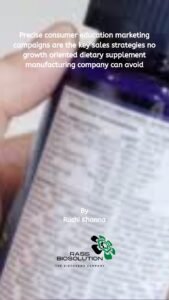Precise consumer education campaign marketing is what every growth oriented dietary supplement manufacturing companies have in common
Why consumer education for Dietary Supplements is a must?
Effectively marketing dietary supplements while complying with advertising regulations and avoiding misleading claims can be difficult. Communicating the benefits, proper usage, and limitations of supplements to consumers requires careful messaging and consumer education efforts. Educating consumers about the role of supplements in a healthy lifestyle and managing expectations are ongoing challenges.

Consumer education plays a pivotal role in the marketing campaigns of dietary supplement manufacturing companies. As these companies strive to provide accurate information, build trust, and promote responsible supplement use, effective consumer education becomes crucial. This article presents valuable consumer education marketing campaign ideas for dietary supplement manufacturers to build on their recurring consumers.
Consumer education with scientific foundation
Consumer education should be based on a solid scientific foundation. Ensure that the information you provide is supported by credible research, clinical studies, or expert opinions. Highlight the benefits of the supplement, but also emphasize the limitations and areas where further research is needed. Transparently presenting scientific evidence builds trust and credibility with consumers.
Clarity and accuracy are strong pillar of consumer education
When communicating about specialised dietary supplements, use clear and concise language that consumers can easily understand. Avoid jargon or technical terms that may confuse or mislead. Provide accurate and truthful information about the supplement’s ingredients, dosage instructions, and potential benefits or risks. Clearly state any limitations or contraindications to help consumers make informed decisions.
Consumer education has to be simple, contextual and provide perspective
Contextualize the role of dietary supplements within a broader framework of overall health and wellness. Educate consumers about the importance of a balanced diet, regular exercise, and consulting healthcare professionals before starting any new supplement regimen. Emphasize that supplements are not substitutes for healthy lifestyle choices but can complement existing efforts.
Safety and quality assurance driven consumer education
Consumer safety is paramount. Highlight your company’s commitment to quality assurance, including adherence to Good Manufacturing Practices (GMP), rigorous testing, and ingredient traceability. Educate consumers about potential risks, including the importance of reading labels, following recommended dosages, and reporting any adverse reactions. Emphasize the need for purchasing supplements from reputable sources.
Consumer education has no meaning if communication channel is unreachable to target audiences
Utilize a variety of communication channels to reach a wider audience. Combine traditional methods such as brochures, product packaging, and print media with digital platforms like websites, social media, and educational blogs. Engage in interactive content, such as videos or webinars, to explain complex concepts and answer consumer questions. Tailor your messaging to each channel, ensuring consistency in key information.
Case study based independent Verification as consumer education conclusion
Empower consumers to conduct independent research and seek information from trusted sources. Encourage them to consult healthcare professionals, nutritionists, or dieticians for personalized guidance. Provide a list of reliable resources, such as reputable scientific journals, government health websites, or professional associations, where consumers can access further information.
Finally consumer education is a vital component of dietary supplement marketing campaigns. By following these tips, dietary supplement manufacturing companies can establish themselves as trusted sources of accurate and reliable information. Transparently educating consumers about the benefits, limitations, and responsible use of supplements fosters a culture of informed decision-making and promotes long-term consumer satisfaction. Ultimately, effective consumer education not only benefits individual consumers but also contributes to the overall credibility and success of the dietary supplement industry.
By
Ruchi Khanna
